
 Pong Squared
Pong Squared
http://pong-squared.appspot.com
I was recently revisiting some old projects of mine and came across a small weekend-project game I wrote back in 2014 using the libGDX framework. libGDX describes itself as "...a cross-platform Java game development framework based on OpenGL (ES) that works on Windows, Linux, macOS, Android, your browser and iOS." I don't recall why I chose libGDX at the time, but it likely provided one of the few free-to-use game engines and the idea of writing one app that I could deploy to multiple platforms with very little setup.

Anyway, at the time, an idea that intrigued me was taking old retro games and modernizing parts of them. For this particular experiment, I wanted to explore "what if pong supported more than 2 players?" To keep this simpler, I forewent any concept of real-time multiplayer with other humans and decided to keep it to 1 human and 3 other simplistic CPU-driven opponents. ~600 lines of code later (probably a third of which was just boilerplate), and I had a working (albeit kind of janky) game.
There's not a lot else to add here. libGDX was pretty easy to work with and after a couple days, I had a working game. I tweaked things a bit more over the next few days when I had some free time visiting family around Christmas and called the project "done." The web version is hosted on Google and although I never published the Android APK, send me a message if you'd like a free copy of it.